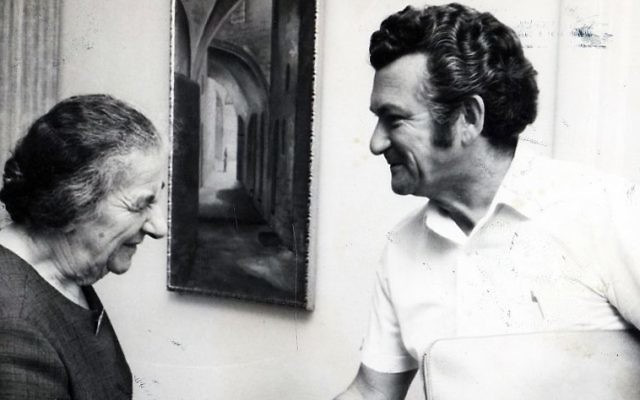Bob Hawke: From a love affair to ‘just friends’
AUSTRALIAN Jews and the State of Israel owe Bob Hawke a great deal, writes Sam Lipski.
AUSTRALIAN Jews and the State of Israel owe Bob Hawke a great deal, writes Sam Lipski.
The warm tributes and eulogies from the Jewish community and the Israeli Embassy about a great Australian and a great friend have highlighted our debt to him since his death last week. Moreover, the myriad awards from a grateful people, a JNF forest in Israel chief among them, attest to Jewish history’s judgement. But we also owe Hawke and ourselves a “din v’cheshbon”, a reckoning, of how the great friendship began, how and why it changed, and how, towards the end, it faltered.
So where to begin? Hawke himself always said it began with his first visit to Israel in 1971 as ACTU president, and his meeting with Golda Meir which he described as “a life-changing event”. On his return to Australia, he described Israel as an inspiration, a small lone democracy in the Middle East. He warned: “If the bell tolls for Israel, it won’t just toll for Israel, it will toll for all mankind.”
An emotionally wrenching second trip followed in November 1973. After the Yom Kippur War, Hawke was the first non-Israeli visitor to the Golan Heights, where the still smouldering carnage of battle confronted him. This time on his return home, and now as ALP president in addition to his ACTU role, he clashed repeatedly with prime minister Gough Whitlam on Canberra’s “even-handedness”. Hawke denounced it and the Socialist Left’s anti-Israel attacks as morally repugnant, and inconsistent with the ALP’s policy. But his outspoken advocacy for Israel, unprecedented in Australian political life, earned him death threats. Jewish friends and supporters rallied behind him.
Fast forward to some two years before he became Australia’s 23rd prime minister in 1983. That was when Hawke told his biographer Blanche D’Alpuget: “I’m an Israeli. If I were to have my life again, I would want to be born a Jew.”
This was Hawke speaking from the heart. Which he readily admitted he often wore on his sleeve. And not just about Israel. But his wanting “to be born a Jew” came during the dominant first phase – from 1971 to 1983 – of the complex emotional and intellectual relationship with Israel and the Jews which continued nearly 50 years until his passing.
Some of the passion in that early love affair with Israel, for that is what it was, waned during Hawke’s time as prime minister (1983-91). In this second phase of the relationship, although he remained broadly supportive of Israel, he became increasingly critical of its policies towards the Palestinians. And while his commitment to Soviet Jewry, driven by his first harrowing encounter with the refuseniks in Moscow in 1979, continued during his time in Canberra, he grew steadily more impatient and frustrated with successive Israeli governments over the Palestinian issue. Moreover, he allowed the impatience and irritation to spill over into his admirable, indeed heroic record on Soviet Jewry.
Then, in the 28 years that followed his prime ministership until his death last week, which I regard as Hawke’s third phase in the relationship, he moved even further away from the love affair of his younger days. His disillusionment with the Benjamin Netanyahu government grew. It culminated in February 2017 on the eve of Netanyahu’s visit to Australia, when he joined former prime minister Kevin Rudd, and former foreign ministers Gareth Evans and Bob Carr, in calling on Australia to recognise a Palestinian state.
What explains the arc of change? Clearly, the Hawke who had said in 1971, “Every decent human being must be committed to the viability of Israel,” was not the Hawke who wrote in 2017: “Like the Jews in the Soviet Union and the blacks in South Africa, the Palestinians have an aspiration to be fully free … Is there not emerging the danger of Israel being blinded to the threat to its very soul and the vision of its future?”
But wait a minute. When I read those sentences in 2017 I immediately recognised them. They were almost exactly the same sentences Hawke had used in a speech he made as prime minister in 1988. Some 40 years earlier in the Melbourne Concert Hall, as 3000 Jews cheered and applauded him as their hero, Hawke welcomed 15 newly released refuseniks whom he had helped to free in his Moscow summit with Mikhail Gorbachev in late 1987.
But then he moved from speaking about Soviet Jewry to Israel and the Palestinians. He said “the democratic, humanist principles on which Israel was built do not sit easily with the role of master of the occupied territories and subject peoples”, and compared the refuseniks to the Palestinians and black Africans under apartheid.
At the time the editorial I wrote in The AJN said: “Bob Hawke is a genuine legend in his own lifetime among Australian Jews … and even the offensive analogy he drew between the refuseniks and the Palestinians cannot destroy the Hawke legacy. But something has happened to tarnish it. The special relationship will never quite be the same again.”
Nor was it. In retrospect, the night at the Concert Hall – May 17, 1988 – can now be seen as a turning point. It was Hawke’s public announcement of what had been happening to “the special relationship” for a while, ever since he had become prime minister. As he saw it, it had gone from love affair to “just friends”. But as was clear from the tributes and the eulogies at his passing, and despite the latter years, the Hawke legacy remains.
Sam Lipski is chief executive of the Pratt Foundation and a former editor of The AJN.


comments